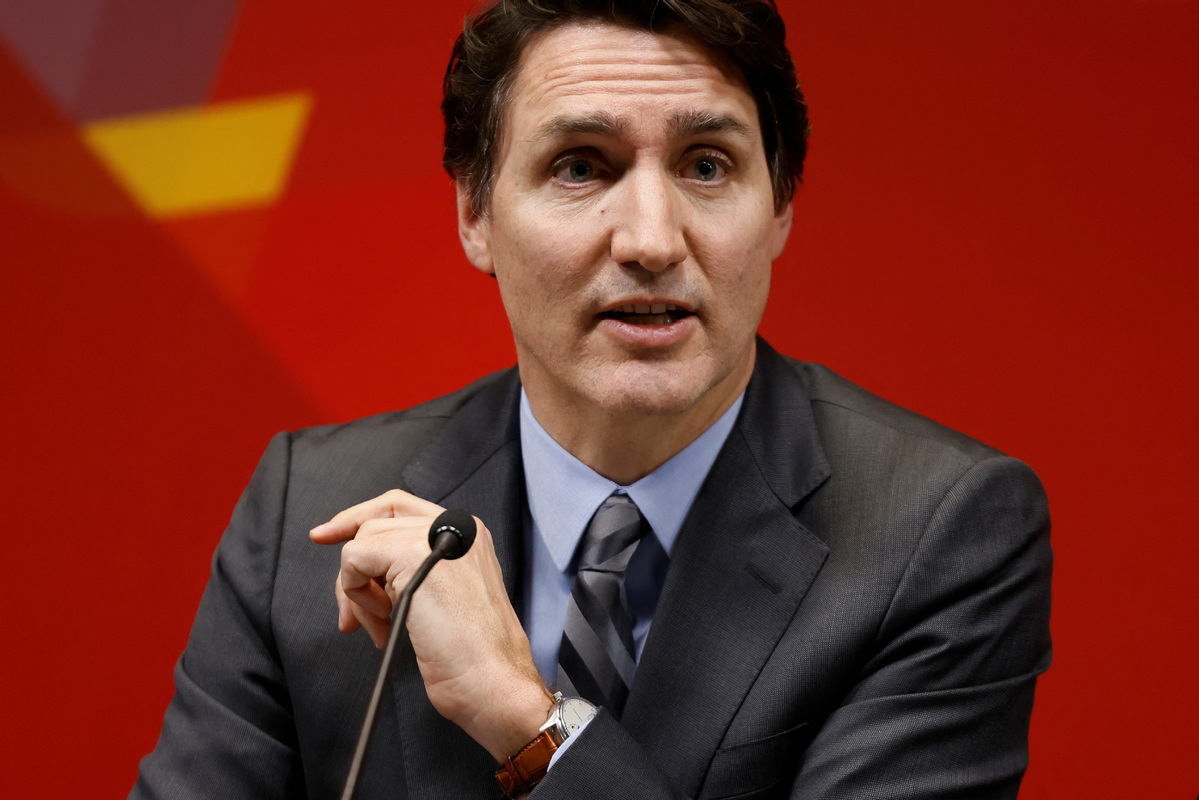
Canada's Prime Minister Justin Trudeau speaks during a press conference following a meeting of provincial and territorial leaders in Ottawa, Ontario, Canada January 15, 2025. [Photo/Agencies]
The pending resignation of Canadian Prime Minister Justin Trudeau has opened a debate on the direction of the country's policies.
Trudeau announced his resignation on Jan 6, and said he would remain as prime minister until his ruling Liberal Party picked a new leader.
"A change of prime minister within the same party, I don't think, makes any difference. The structural factors that shape trade policy remain unchanged, regardless of leadership transitions," Robert Wolfe, professor emeritus at Queen's University, told China Daily.
"There's tremendous continuity in Canadian trade policy," said Wolfe, who served as a foreign service officer in the Department of External Affairs.
But he dismissed the idea that Trudeau is directly responsible for the more general economic challenges facing Canada, pointing to global factors such as the COVID-19 pandemic and inflation.
"To the extent that people think Trudeau is responsible for economic problems in Canada, they may feel better that he's gone," he said.
Wolfe acknowledged that some sectors, especially oil and gas, are unhappy with Trudeau's policies. However, he noted that core policies, such as industrial carbon pricing, wouldn't see significant shifts with different leadership.
"Business has already started making significant investments aligned with industrial carbon pricing. Any major rollback would be both economically disruptive and politically unwise," he said.
US President-elect Donald Trump has criticized Canada and suggested that it become the 51st state of the United States.
"It's a very silly idea with no implications, other than worrying about how many people in Congress might take him seriously," Wolfe said.
He said such rhetoric distracts from concerns like trade tensions, including Trump's proposal of a 25 percent tariff on Canadian imports.
Regarding US-Canada trade relations, Wolfe said he believes Canada's geographic and economic ties to the US limit the scope for significant policy shifts.
"Canada is a fairly small, open economy heavily reliant on its trade relationship with the US.
"The fundamental economic interests of both countries don't change based on who occupies the prime minister's office," he said.
Wolfe sees potential opportunities in Canada's relationship with China, particularly in fostering a more stable diplomatic dynamic.
Wolfe said Canada and China are likely to maintain their cooperative engagement in multilateral forums like the World Trade Organization, where they often align on issues.
"While leadership changes may influence the tone or short-term tactics, the core economic and trade policies are expected to remain consistent," he said.
Andrea Perrella, an associate professor at Wilfrid Laurier University, offered his insights on Canada's domestic politics.
"Elected members of the Liberal Party were increasingly voicing their concerns about Trudeau's leadership, and public opinion polls have, for a long time, been very unfavorable to him," he told China Daily.
The timing of Trudeau's departure could serve as a strategic move to address those pressures, he said.
"A leadership campaign can attract considerable attention and draw potential voters to reconsider their support for the Liberals," Perrella said. "But whether this support will last is another question."
Trudeau's resignation could also reshape the dynamics between the Liberal Party and other major parties, like the Conservatives and the New Democratic Party.
"If the leader veers the party to the right, it may draw some support away from the Conservatives. However, such strategies have not always worked well for the Liberals in the past," he said.
Changes in priorities
Perrella speculated that Trudeau's resignation could lead to changes in Canada's policy priorities, particularly in response to external pressures.
"It is likely that Canada will increase defense spending in reaction to Donald Trump's statements and potentially adopt a stricter stance on borders," he said.
"If trade with the United States becomes more difficult, Canada will necessarily have to open up trade deals with other parts of the world," Perrella said, likening Canada's potential trade strategy to that of "a northern Australia".
Julian Castro-Rea, a professor of political science at the University of Alberta, told China Daily that Trudeau's resignation could presage a significant shift in Canada's foreign policy.
"The bad news for Canada is that his departure may signal a turn to the right for the country's government, aligning even more with US priorities," he said.
He suggested that Canada is increasingly perceived as a relay of US power, and the trend could deepen under potential successors, such as Conservative leader Pierre Poilievre or former deputy prime minister Chrystia Freeland.
Castro-Rea said he regretted what he called Canada's dwindling role in promoting hemispheric partnerships, especially with Latin America. He added that Canada had prioritized relationships with what he called hegemonic political and economic global powers over the interests of Latin American countries.
Castro-Rea said he expects Canada's foreign policy to take a more conservative turn.
gaoyang@chinadailyusa.com